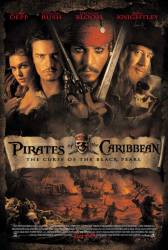
Question: After Elizabeth is brought to the Pearl, she threatens to drop the medallion overboard. Barbossa feigns disinterest but when Elizabeth pretends to drop it, the pirates gasp in panic. Why? So she drops it, big deal. They can't drown, the gold "calls to them" so what does it matter if she were to drop it?
Chosen answer: Because they'd have to find it. The gold may "call to them", but it obviously doesn't function as a millimetre perfect homing beacon or they'd never have missed the medallion years earlier when they attacked the ship carrying the young Will. Elizabeth drops it into the sea and they're going to have to spend what could be months trying to locate it - currents could take it well away from the dropping point. They've found the final missing piece; they're potentially just hours away from finally being cured. The last thing they want is to see it thrown into the sea.
Well, if the crew was anxious to get the medallion then why did they act like they weren't interested in it before Elizabeth pretended to drop it?
What do you mean by reverse psychology?
By showing they are not interested in the medallion they are hoping Elizabeth will just drop it on the floor or chuck it to them as it's of no real value. However when she releases a bit of chain and the medallion drops, and the pirates lurch forward revealing that they really want the medallion and as such Elizabeth now has the upper hand in negotiations.
I'm guessing Elizabeth wasn't fooled when the pirates showed disinterest in the medallion.
That's not called reverse psychology, which is used to encourage someone to change his or her mind. Doesn't work with a threat. They are feigning indifference to hide the importance of the object.
They didn't want to give her an advantage over them. Pretending to not care about the coin would make Elizabeth think that the coin is worthless and cannot use it to barter a deal.
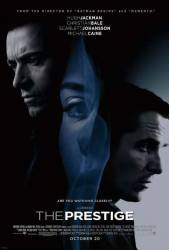
Question: In Angier's final performance Borden watches Angier's duplicate drown in the tank. Does the other Angier still reappear for the audience, and take a bow? They never explain this in the film. If he does take the bow, Borden would never have been accused of murder. If he doesn't take the bow, how does the duplicate know not to do so? The duplicate would have no idea that Borden was below stage.
Answer: Angier always wants to take revenge on Borden as he is the reason behind the death of his wife. He knows that Borden is in the crowd the two times, first time, Olivia suggests Borden to watch the new "Transported Man" trick of Angier, where Borden finds out the trap door in the bottom of the machine, second time, Borden wants to know how Angier flies that distance with in seconds through the trap door. As expected by the Angier in the final play, Borden reaches the back stage where actual Angier is drowning (it is as always actual Angier drowns and the replica of Angier appears at some distance in every performance). So, as per the plan the replica hides to create an impression that Borden intentionally murders Angier. Note: the replica of Angier has the same ability and sense like actual Angier.
It's never stated whether the "real" Angier drowns or takes the bow, but it's implied that it doesn't matter - as the clone is a perfect copy, they are both "Angier." Angier at one point says, referring to toll the trick has taken on him, that each time he did it, even he himself didn't know whether he would be the man in the box or the prestige. Similarly, when Angier asked Tesla which hat of all the duplicates was his, Tesla replied "They are all your hat."
Answer: No, he does not appear to take a bow. The set-up is as follows: Angier invites the audience on stage to observe the machine, but in reality it is so he can watch for Borden trying to work out the trick. When he sees Borden in the audience, he also knows Borden will not learn anything from the stage, and will go backstage. He then clones himself, and the clone is created with the exact knowledge he had at the time of the cloning, including Borden's presence and the trap the original Angier had set. So the "new" Angier hides away the best he can, letting Borden be framed for the murder of the "original" Angier. Had he appeared, not only would it ruin his plan of framing Borden, but it would also reveal how he had done his trick, and he would not allow any of those to happen, no matter what.
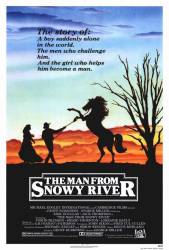
Question: How did they make Kirk Douglas have a peg leg? How was he able to walk that way?
Answer: This movie predates the more advanced CGI that would be used these days. In older films, actors portraying an amputee would have their leg (or arm) bent back and strapped to their body. A prosthetic peg leg would be attacked to the lower appendage. The actors were also filmed from strategic vantage points so the bent part of the limb didn't show. When Douglas is seen driving a wagon, the seat was probably constructed so that his lower leg fit into a hidden compartment and the peg leg was attached on top to be visible. Douglas also wore rather baggy pants, and that would help conceal his bent leg.
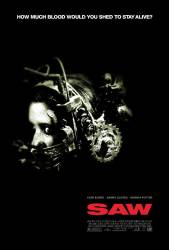
Question: This question applies to the whole series. Why do some of the people who actually manage to survive Jigsaw's traps end up working with him instead of either helping capture him or killing him and insuring that no more innocent people get killed?
Answer: Jigsaw's traps would more than likely leave a person mentally unstable, which could result in Stockholm Syndrome, a condition which involves a victim sympathising with their captor. In fact, after Lawrence Gordon escapes the bathroom after severing his own foot, Jigsaw nursed him back to full health, thus gaining his trust (this is shown in Saw VII). He also plays mind games on people, which is shown in a flashback in Saw III in which he convinced Amanda to side with him. In her unstable state of mind, she realised that he was the first person in her life she could actually relate to, and thus became an accomplice.
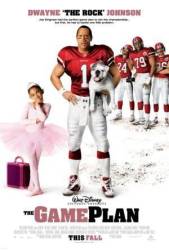
Question: Is the ballet they perform a real ballet? Or is it something made up for the movie?
Answer: The ballet was written for the movie.
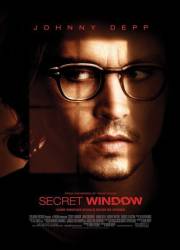
Question: At the end of the credits, we hear Johnny Depp sing "mama's little baby loves shortnin' bread." Is there any reason for this, or a tie-in to the movie I missed?
Chosen answer: An additional reference to the full dominant personality takeover of Shooter, everything gravitates South Mississippi.
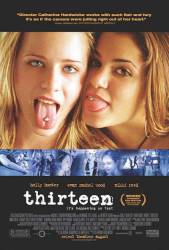
Question: I read that Evan Rachel Wood's character, Tracy, is supposed to be Nikki Reed at the age when she was having the experiences that Tracy went through. Was the character Evie based on a girl that Nikki knew in real life?
Answer: Evie was based off several people in Nikki Reed's life.

Question: What two items were on Mr. Liotta's resume that should have been excluded?
Answer: Mr. Liotta's resume should have excluded her skills, favorite movie, and that she hates bees.

Question: Was there a deleted scene where Cathrine and Ellen were talking while making the turkey in the kitchen and/or doing something resulting in the bird being "overdone" totally and showing up in the scene at dinner causing the turkey to literally explode in a cloud of dust when carved by Clark? It just seems there was a scene missing there!
Answer: YES! You are 100% correct about the deleted turkey-cooking scene! Both my husband and I remember this scene. It was Catherine and Eddie that cooked the turkey to thank Clark and his family for being hospitable. They had never cooked a turkey before and they thought cooking it at a low temperature for a LONG time would be ideal. It looked great, but completely dehydrated. THIS is why Catherine is so upset when the turkey pops open and steams - she ruined the turkey for everyone.
Answer: There was never a scene as described in the film, nor was there anything in any of the special features. Also, there is no mention of it in any of the commentary.
I remember the scene with Catherine and Eddie in the kitchen, putting the turkey in the oven. Catherine said she thought they were putting it in too early.
Answer: I have a DVD with the exploding turkey scene It's a classic.
Answer: I also remember vividly the scene where Catherine is cooking the turkey and have been trying to get a copy of the film where that scene is not deleted. Also checked with my wife, she recalls it too. I think we might have seen it on a very early VHS or LaserDisc version.

Question: How was Obi-Wan going to become more powerful after he was dead?
Answer: It is heavily implied that one who becomes a Force-Ghost achieves an untold level of power upon entering the state. Given that they have become a pure entity of the Force, it seems to back up the statement. Obi-Wan also becomes free to assist Luke in any case.
In addition to this answer, I think Obi-wan also became powerful because he "let go." He did not feel a need to defeat Vader on this occasion - he was willing to surrender the fight and "move on" to a new state. Something that Vader might not currently understand.
Answer: I agree with Darius Angel's comment. I also think Vader expected a certain sense of satisfaction after defeating his former master. In reality, though, he was still "owned" by the Emperor and was living with the consequences of his choices. Defeating Obi-wan did not change much for him. Obi-wan, however, gained the benefits that Darius Angel mentioned.

Question: What does the saying "Why don't you make like a tree, and get out of here", mean?
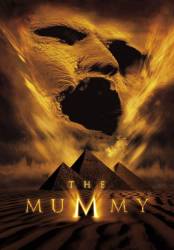
Question: Do the symbols / markings on Ardeth Bay's face mean anything?
Chosen answer: The tattoos on his forehead are the Egyptian Hieroglyphs that spell "Underworld", and the ones on his cheeks are the Egyptian Hieroglyphs for the word "truth." All Medjai males get these tattoos as part of the coming-of-age rite, when they turn sixteen, of which the most important is the tattoo on their right wrist (which Rick O'Connell also has) that marks them as "warriors for God." Other tattoos specific to Medjai males are on their arms, forearms, hands, pectorals, shoulder blades and beneath the navel - the tattoos on the nose and chin are no longer used, since the time of Seti I. Medjai females only get the wrist tattoo when they come of age, but are not marked with any of the other symbols that are particular to men. Fun fact: If the Medjai - male and female alike - shows any sign of pain or cries during the tattooing process, it is considered that they have brought shame to their family.
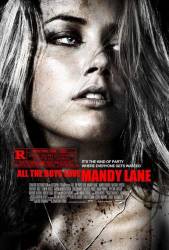
Question: ***SPOILER WARNING*** I don't understanding the ending to this film. What was Mandy's reason for killing people? Is this a flawed character motivation, or did I miss something?
Answer: The reason for Mandy and Emmett killing off the characters is pretty much left open for interpretation, but it seems the reason they killed them was because before Mandy became "hot over the summer" (as Dylan says at the beginning), Emmett and Mandy were treated like outcasts, and after Dylan's death, Emmett probably took a lot of the blame. It's possible that Emmett and Mandy were tired of how the popular crowd had treated them before. At the end, they made a pact to kill themselves. But after finding out that Emmett is just like the others, Mandy backs out and decides not to, but Emmett doesn't take it very well and decides to kill her too. Mandy fights him off, and she saves Garth, who seems to be the only one at the ranch who saw her as a human being and treated her with respect. So any of these reasons may have been motivation (although their actions are extreme), but overall there seems to be no obvious reason.
Answer: It's likely that Mandy developed a taste for murder subsequent to the Dylan incident, in which she evidently was more complicit than would seem at first glance.
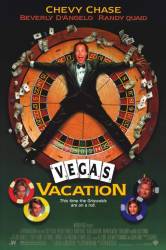
Question: Did the old man really die at the end or was this just a ploy to give Clark the money for considering him part of the family? It all seems too fake. Winking, paramedics not doing anything to revive him, barely checking to see if he is alive, etc.
Chosen answer: Typically people don't give a knowing wink to someone when they are at death's door. I think what the paramedic says was the case. He just really wanted to feel like he belonged to a family. He met them, and they included him, so he wanted to "give back". This was the way he could.

Question: I never really understood what the motive was when Clyde murdered his cellmate. Why did he do it? What did this act have to do with the plot of this movie?
Answer: To make sure he was placed in solitary confinement. The warehouse that he owned and operated out of that was next to the prison also had a tunnel connected to every cell in the solitary wing. Clyde needed to be in one of the solitary cells so he could leave the prison whenever he needed to unnoticed, which also served to make it look like he had an accomplice on the outside.
When Nick is talking to a spook later in the movie, he is quoted as telling Nick: "That cell-mate that he killed, you think that was random? No. That's a pawn being moved off the board. Anyone who had anything to do with that case, he's gonna be coming after you." Just as all deaths played roles in Clydes game, as the audience we are led to believe this inmate played a role, but were never given any resolution as to what significance it was. Not a big deal in grand scheme of things, but unexplained.
I don't know if you just didn't read the answer thoroughly or if you didn't pay close attention to the movie, but Clyde killing his cellmate was far from being unexplained. He can't leave the prison if he's in a regular cell with the general population, so he kills the cellmate in order to get placed in the solitary wing, because every solitary cell is connected to the tunnel in his warehouse that is next to the prison, which allows him to leave whenever he needs to.

Question: At the salmon run, what does the foreign bear say?
Answer: A good translation would be "I almost froze to death while I was going over the huge icy mountain pass, it was something which I only barely survived! Barely!
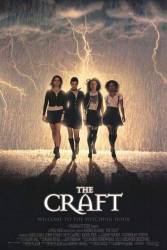
Question: What is the whole conversation in the first French class between Chris' friend, the teacher and Sarah?
Answer: Translation on the board: "if you would have done your homework, you would understand" Teacher: "I hope you had a good weekend" " (Calls to the students name) Your weekend went good?" Student: "Very good" Teacher: "What did you do during the weekend? Did you go to the beach, or did you find a elegant woman?" "Search for a woman?" Student: "oh did you mean did I get laid" (now you see why he says that) Teacher: "In french, in french! (says students name) " Student: "a lot of... a lot of lay" Girl (sorry I forgot her name): "What a idiot, moron" Teacher: "Well, our new student m'am your french is very good!" (Conversation goes on in English) Teacher: (says what the board says) "if you would have done your homework, you would understand" By the way what they're learning in this French class is L'imparfait tense.
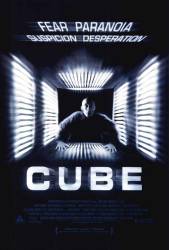
Question: How did Quentin find others in the last scene? he was left unconscious and he had no way to figure out where others went after that (considering his lack of knowledge in mathematics) so how could he possibly make his way to the bridge room?
Answer: It's established that sound travels throughout the structure reasonably well. Also, they didn't travel relatively far, even with the rooms shifting.
Actually, considering the distance that they travelled and the injuries he sustained, Quentin would have had extreme difficulty catching up. It looks like the 3 travelled upwards at least 12 cubes, meaning Quentin would have had to climb up each one with the chance that any of the rooms could be trapped fast enough to catch up to them with enough strength left over to kill Leaven.
Adrenaline is an extremely driving force, so I'd still consider it entirely possible it happened that way.
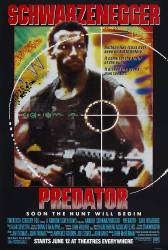

Chosen answer: Yes. The predator can be seen not in the immediate shot after, but the one a few seconds later as they are seen walking away.
XIII
Before or after Ramirez gets hit in the face with the branch?
About 3 seconds before. If you look VERY closely (probably needing to pause the screen around 00:40:55 - about a minute after Billy said, "There's something in the trees"), there appears to be a transparent image of The Predator in the background above the major's (Arnold's) right shoulder. If this is meant to be The Predator, its body is curved around a tree trunk and its arms are extended toward the right of the screen (near Arnold's right ear), camouflaged as green leaves.
KeyZOid
The Predator - in a recognizable form - really wasn't visible until another minute later @ 00:41:55 when it was on the ground approaching Hawkins and the woman.
KeyZOid
That's a tree, not the predator. We see Billy and Dutch head on in "predator vision" as they're talking, which means the predator is directly in front and slightly above them (unknown distance). The thing you're referring to would be in the wrong position.
No, it can't. I've just been through this several times and the predator isn't shown on screen at any time during or just after after the conversation.